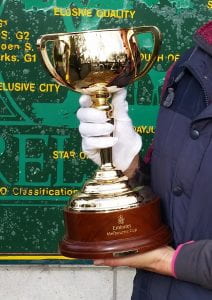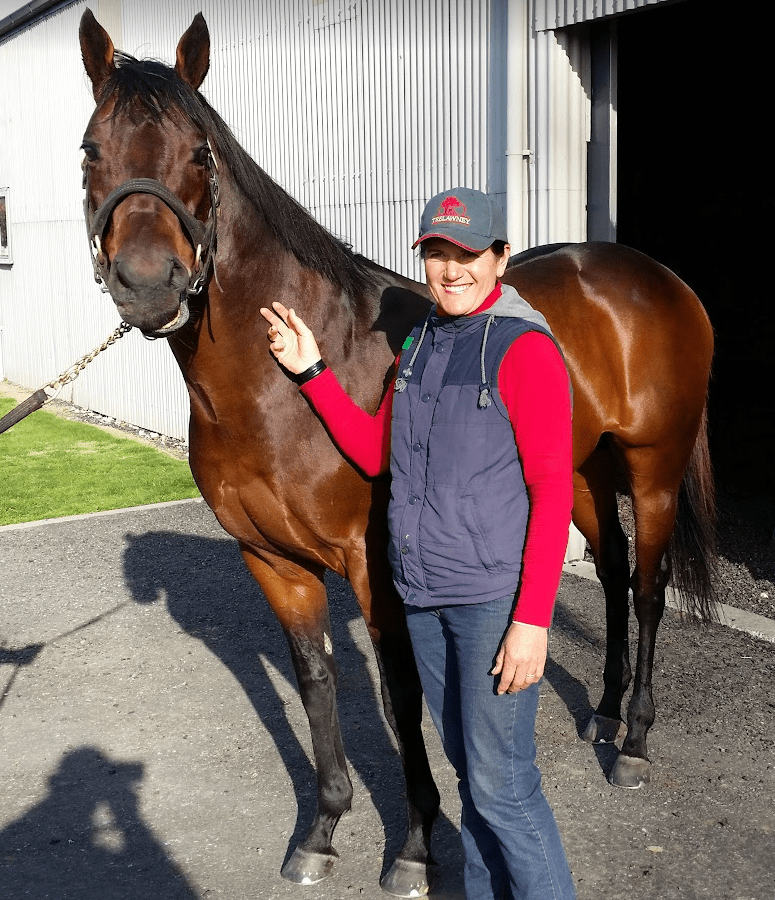Image: UNE PhD student Francesca Brady with Ocean Park, Cox Plate winner, in 2014. Francesca will share her experiences in the horseracing industry over a 35-year career in a memoir for her PhD research project.
The picture of horseracing has undergone a significant transformation in the eyes of the public in recent years.
Exposed to some tragic trackside racehorse fatalities at the Melbourne Cup since 2013, and as concerns over the retirement options for racehorses have emerged, public support has become less effusive and the critics, louder.
But industry insider and UNE PhD student Francesca Brady, says before the pendulum of public sentiment swings too far, it’s important to hear the full story.
Having spent a 35-year career caring for and training horses, she can testify to the unglamorous side of the industry, but it’s not what people may think.
“Industry heads and stakeholders continue to focus predominantly on horseracing as consumption: the race day experience – gambling and glamour. Industry workers, however, have a different focus, honouring a creed: the horse comes first,” Francesca says.
“This necessitates a commitment to accepting working conditions many in society would not, such as exposure to all weathers, working split shifts or night shifts and public holidays, experiencing physical injuries, sleep deprivation, and emotional trauma for moderate pay.
“Empathy for horses, more than anything else, attracts and sustains worker devotion.”
For Francesca, this love has taken a great personal toll: she had to step back from a hands-on role in the industry after suffering a brain injury and 12 months of post-concussion syndrome.
But after learning to use a computer and successfully tackling undergraduate studies at Curtin University, she sees the next goal – completing a PhD – as an extension of her first love.
“Through research, I am able to continue my connection to horseracing, caring for the horses and workers from afar,” she says.
Halfway through her Honours year of a Bachelor of Arts focused on professional writing and publishing, Francesca knew what she wanted her PhD project to be. Happily, she found two supervisors with the right experience within the English and Writing disciplines at UNE.
Her thesis will be a memoir of her experiences in the industry, supervised by Dr Ariella van Luyn, whose interests include practice-led research and creative writing, and Associate Professor Jennifer McDonell, whose research expertise includes animal studies, and who has been actively involved in animal rights work in Australia and abroad for many decades.
“I’m meeting other academics with similar interests and my supervisors are terrific. The most challenging aspects are the volume of reading, and the weight of making this research count for the horses and workers in the racing industry.”
Francesca says the conversation around animal welfare issues in horseracing is currently being led by animal welfare advocates, academics, media representatives and industry heads. Without first-hand accounts in the public domain from those who love and work with the horses day in, day out, the reality of industry practices is misconstrued, and the workers suffer stigmatisation.
Francesca feels a memoir-style thesis will more effectively combat the popular narrative of worker indifference to cruelty claims.
“I decided on a non-traditional thesis because the human-horse relationship is central to horseracing, it is, by nature, intimate, something which cannot be narrated within the objective confines of scholarly text.
“I hope that in offering up my lived experience as an industry insider, I can bring an unheard perspective on issues concerning animal ethics, human-horse relationships, and racehorse industry practices into the public domain,” she says.
“The lived experience of many thousands of workers is vital to ensuring a fair, balanced and informed conversation.”

Francesca Brady holding the 2014 Melbourne Cup



Recent Comments